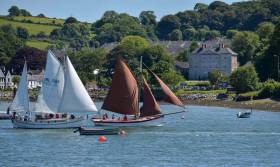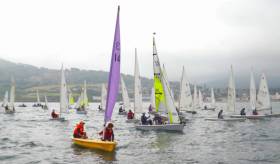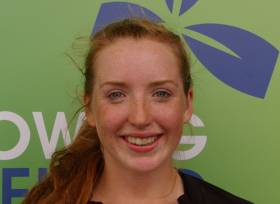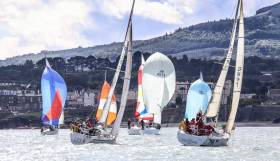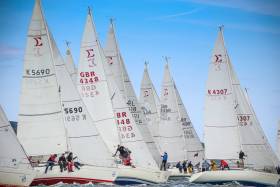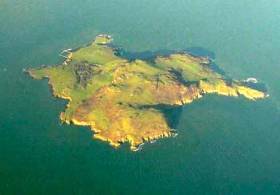Displaying items by tag: Regatta
Great Sailing Conditions for Carlingford Lough's Junior Regatta
On the last Saturday in August, it was the turn of the Juniors of Carlingford Lough Yacht Club to race in their own regatta, along with visitors from across the Lough at Carlingford Sailing Club.
Carlingford Lough YC is situated on the north shore of the Lough at Killowen in Co Down at the foot of the Mourne Mountains and CSC is in Carlingford town on the south side in County Louth with a backdrop of Slieve Foye.
Conditions were kind to the 15 strong fleet with sunshine.
The top three in the prize list of the Junior fleet were all ILCA 6s, with first David Fegan, second Maya O’Neill and third Fiachra McCormick. In the Novice division, it was Jack Ives first and Emma Gibbons second in Toppers.
 Carlingford Lough competitors racing
Carlingford Lough competitors racing
Results are below
Stella Maris Rowing Club will be holding its annual regatta on the River Liffey this coming Sunday 10 July with the competition getting underway from 10 am at Poolbeg Marina in Dublin’s Docklands.
The day is so far promising dry weather with light winds, which will bring some cheer in a season that’s suffered from blowouts and poor conditions for coastal rowing in the early part for the East Coast circuit.
And it also marks the Ringsend club’s first full regatta since 2019 before the pandemic, so the celebratory mood will be expectedly high.
 Under-12s will be a part of a packed junior racing programme this Sunday | Credit: Stella Maris Rowing Club
Under-12s will be a part of a packed junior racing programme this Sunday | Credit: Stella Maris Rowing Club
Ten clubs from along the East Coast from Balbriggan to Arklow will be taking part, bringing over 120 crews onto the water throughout the day in racing across 16 different categories.
The draw takes place at 9am for the race list, which includes Novice, Inter, Junior and Senior Men and Ladies, U12s mixed, U14 for Boys and Girls, U16 for Boys and Girls, U18/U21 for Boys and Girls and a Mixed class.
Coxswains meet at 9.30am and the first race starts at 10am. For the full race order see the club’s Facebook page HERE.
 Stella Maris’ Realt Na Mara in action at a previous regatta | Credit: Stella Maris Rowing Club
Stella Maris’ Realt Na Mara in action at a previous regatta | Credit: Stella Maris Rowing Club
Download the full race list below. Draw at 9 am, Coxswains meeting at 9.30 am and first Race @ 10 am
Crosshaven Trad Sail returns for another year this weekend from Friday 14 to Sunday 16 June with a packed programme of festival events around the historic boat regatta.
Registration (€25) is open for participating skippers, with early arrivals potentially having a regal audience as the Dutch royal family makes a special visit to the Cork Harbour village on Friday, as previously reported on Afloat.ie.
Celebrations begin at The Oar Bar on Friday evening with live music upstairs from 8pm.
Action on the water gets under way at 2pm on Saturday in the vicinity of The Grassy after a 12.30pm skippers’ briefing at Hugh Coveney Pier.
That will be followed by more craic across Crosshaven’s pubs, with a ‘Pirates’ Pub Crawl’ getting started at Fitzy’s Bar from 7.30pm.
Hopefully there won’t be too may sore heads at the breakfast BBQ on Sunday at Hugh Coveney Pier in aid of Crosshaven Sea Scouts.
Sunday racing for all types of craft gets going at 2pm, before the Parade of Sail to wow spectators at 4pm, and the regatta prize-giving ceremony on the pier at six.
The Sunday also promises to be a fun-filled family day out, with a junior knot-typing competition, crab fishing, fancy dress, face painting, a colouring contest and more from 11am, while Crosshaven RNLI will also be hosting their Open Day at the lifeboat station from 1pm.
For full details of what’s happening in Crosshaven this weekend, see the Crosshaven Trad Sail website and follow on Facebook.
#Rowing: The hosts won the men's senior eights title at Trinity Regatta today. The Trinity/Lady Elizabeth crew had a length and a quarter to spare over Blue Star, a British crew which featured Scott Durant, an Olympic gold medallist, along with former Ireland internationals Cormac Folan and Niall Kenny.
The men's senior singles went to Michael Maher after a disqualification. The race featured a clash between the two Commercial men, after which Niall Beggan was disqualified.
The women's novice eight gave DULBC a chance to show their mettle. They raced Neptune in the final and won well. Bann's women's junior 18 eight looked strong and crossed the line ahead of Graiguenamanagh - but Bann were disqualified for not staying the right side of a buoy.
Brian Colsh of Sligo continued his good run by taking the men's junior 18 single, while Galway beat Blackrock in the men's junior 16 eights final.
Bray Sailing Club’s Junior Regatta Set For Friday
#YouthSailing - Bray Sailing Club has announced details of its 2018 Junior Regatta, taking place this coming Friday 27 July.
Last year’s regatta was Bray’s largest open event, and this year the club hopes to welcome even more visitors from neighbouring clubs and make the event even bigger.
The Notice of Race, sailing instructions and entry form are now available to download from the Bray Sailing Club website.
If you are planning to bring a boat to the regatta by road, or have any other queries as a prospective competitor, contact [email protected].
#Rowing: Ireland’s new pair of Emily Hegarty and Aifric Keogh put in a decisive sprint in the final 200 metres to take a crucial third place in their heat at the World Cup Regatta in Belgrade this morning. Britain took the first two qualification places for the semi-finals. For much of the race, Serbia held third, with Ireland lagging behind by over a length in fourth and set to go to a repechage. However, Ireland finished well and passed the hosts.
World Cup Regatta, Belgrade (Irish interest)
Women
Pair – Heat One (First Three to A/B Semi-Finals; rest to repechage): 1 Britain One 7:19.05, 2 Britain Two 7:22.92, 3 Ireland (A Keogh, E Hegarty) 7:23.77.
Lough Rynn Regatta Cancelled due to Weather Forecast
#Rowing: The organisers of Lough Rynn Regatta, set for Saturday, have cancelled the event. As Thursday went on the weather forecasts suggested that the mean speed of the win would be over 20 kilometres per hour with gusts which could make rowing on some parts of the course unsafe.
John Walsh, the regatta secretary, sent out a statement which said:
It is with huge regret and a heavy heart that the committee of Lough Rynn Regatta communicates this press release to inform the clubs that the Regatta for 2018 scheduled for 5th May 2018 has been cancelled due to the forecasted wind and wind gusts that are promised tomorrow during the middle of the day.
In the interest of athlete and volunteer safety we have made this decision in as timely a manner as possible. We gave the forecast every chance to improve once it deterioated yesterday afternoon and have even debated which forecast is the best to use. To be fair to all of the 41 clubs and 443 crews that were due to compete on the day and that were to due to travel from all over the country this decision is now being communicated in line with the initial announcement last night.
We would sincerely like to thank each and every one of the clubs, athletes and coaches who entered in such large numbers and to our army of volunteers who had set aside their day for the hosting of a successful regatta. Included in our volunteer rota was Mr. Eamonn Colclough, President of Rowing Ireland and Ms Michelle Carpenter the newly appointed CEO of Rowing Ireland. All our volunteers who have worked tirelessly over the past number of weeks are all equally devasted but safety comes first in this instance.
We will review the rowing calendar and hopefully will be back later in the year with an alternative event / date.
Thank you all for your continued support.
Yours in rowing
John Walsh
Regatta Secretary
East Coast sailing fans are expecting a big weekend for the 'Taste of Greystones' Regatta this Sunday and, as the name suggests, Greystones Regatta in County Wicklow is about a night–out followed by a morning's racing. 'The night out is guaranteed, says Greystones Sailing Club Commodore, Darragh Cafferkey, 'the racing now lies with the wind gods'.
'All this week the weather forecasts have been bouncing from five to 25–knots and from factor 50 to umbrellas', Cafferkey told Afloat.ie
It must surely be a case of third time lucky for the Wicklow initiative because the last two editions have been cut short due to lack of wind.
As Afloat.ie reported earlier this week, 55 boats are already entered – and that's ahead of 2016 numbers at this stage – to the extent that Cafferkey, himself a top Irish Sea Offshore campaigner, estimates 140 boats are expected for the raft–up at Greystones Marina in preparation for the two race series on Sunday morning that marks the end of the Summer sailing season on the East coast.
In 2013, the inaugural regatta attracted 68 boats, in 2014, this had grown to 80 and in 2015 the regatta broke the 100–mark with 2016 witnessing further growth.
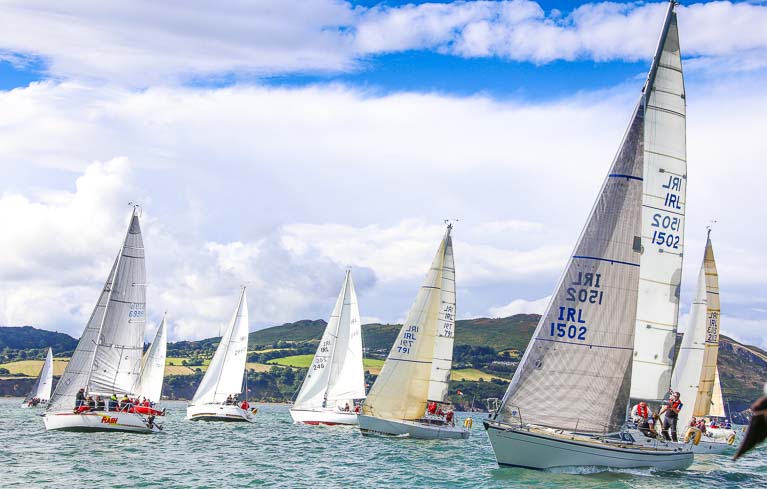 Cruiser–racers will race on two separate courses this year at the Taste of Greystones Regatta in County Wicklow Photo: Afloat.ie
Cruiser–racers will race on two separate courses this year at the Taste of Greystones Regatta in County Wicklow Photo: Afloat.ie
This year the event will be split into two courses with Class 1, 2, 3 racing on North course and White Sails in two fleets on South Course.
As Afloat.ie reported in August 2013, the regatta was originally established in a format that would attract all the East Coast clubs that don’t typically travel, it has grown in size with the following clubs all confirming feeder races.
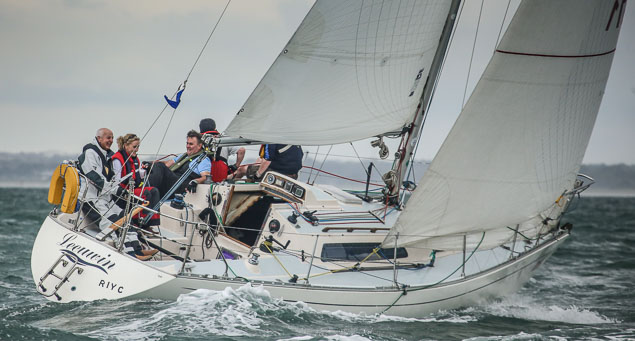 Dublin Bay's Bobby Kerr is a past competitor at Greystones sailing his Sigma 33 Leeuwin from the Royal Irish Yacht Club. Photo: Afloat.ie
Dublin Bay's Bobby Kerr is a past competitor at Greystones sailing his Sigma 33 Leeuwin from the Royal Irish Yacht Club. Photo: Afloat.ie
Wexford/Courtown will race to Arklow and join the Arklow fleet for a race to Greystones Harbour.
Wicklow Sailing Club, Bray Sailing Club, Poolbeg Yacht and Boat Club and Clontarf Yacht and Boat Club have all confirmed races to Greystones on Saturday, Caffekey told Afloat.ie
Dublin Bay will have a feeder race available for all classes and ISORA have over 25 entries confirmed for its race to Greystones.
Over ten boats from Howth have also entered meaning almost every club on the East coast plan to attend.
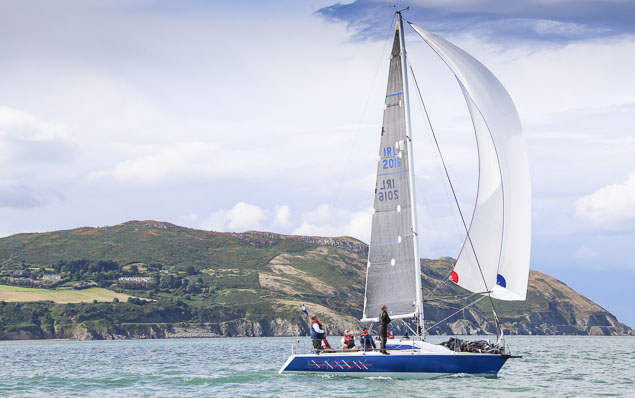 Dave Cullen's champion Checkmate is a regular competitor off Wicklow Photo: Afloat.ie
Dave Cullen's champion Checkmate is a regular competitor off Wicklow Photo: Afloat.ie
A feature of the event is that it is run both on IRC/Standard ECHO and current ECHO. IRC/Standard Echo with only a few points between them means all boats regardless of certs can race based on the boat' s rating, according to Cafferkey.
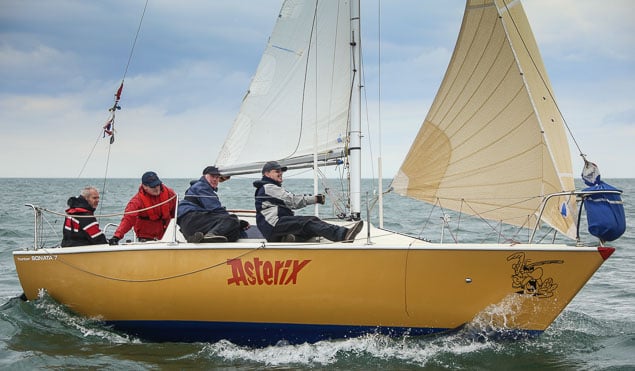 Frazer Meredith's Astrix, a Hunter Sonata, is heading for Greystones Photo: Afloat.ie
Frazer Meredith's Astrix, a Hunter Sonata, is heading for Greystones Photo: Afloat.ie
The current Echo means that the many non Dublin Bay clubs can use their own local ratings to come to a joint event . There is a limit on current echo to 3%+/- the boats standard handicap.
It is this decision four years ago that made it realistic for all East Coast clubs to come and compete. 'So prizes based on your boat and prizes based on your club performance. Something for everybody', Cafferkey says.
The support of sponsor BJ Marine has allowed Greystones Sailing Club organisers extend hospitality at its new club house that opened over a year ago on the South Pier, to include berth, BBQ, beer in Club and Beachouse plus Breakfast on Sunday. 'Throw in some Musto discounts, Water, bars and sandwiches on the water and there is little left uncovered', Cafferkey says.
First gun at Greystones on Sunday is at 10.55am.
Are you Interested in Sailing or Buying a Sigma 33?
Are you Interested in Sailing or Buying a Sigma 33?
Experience a sail at our Open Morning on Sunday, 24th September 2017 at the Royal St. George Yacht Club
from 9.30–1.00 O’Clock
Followed by finger food in the Club afterwards
For more details call Paddy Maguire 087 2361916 or e- mail [email protected]
More details on the Sigma 33 class from the 2017 season below.
The Volvo Dun Laoghaire Regatta was for the Sigma 33 one design class the third major open Championship of 2017. The season stared in Tarbert, Scotland at the end of May, with the Scottish series with ten competitors and was won by “Mayrise” James Miller of Cove Sailing Club (CCC) with four wins from eight races.
The next event was in Helensburgh in Mid-June for the Class Championships which was won by “ Miss Behavin” Alan Lennox, Helensburgh Sailing Club. The 13–boat fleet completed eight of the ten planned races over the three days.
The Dun Laoghaire Regatta series had 19 entries including nine from the home waters and ten visitors from Northern Ireland, Scotland, England, the Isle of Man and local boats from Arklow and Waterford. The nine race series was dominated the top six visiting boats. Most of them had competed in Tarbert and Helensburgh and benefited from the close racing at both events. It proved very difficult for local boats to break into the top six in any race. The racing was very competitive with places changing on all legs. The Dun Laoghaire Regatta series was won by Alan Harper & Kristy Robertson in “ Mayraise” The Irish Championship were run in conjunction with the regatta and won by Paul Prentice in “ Squawk” from the Royal Ulster Yacht Club.
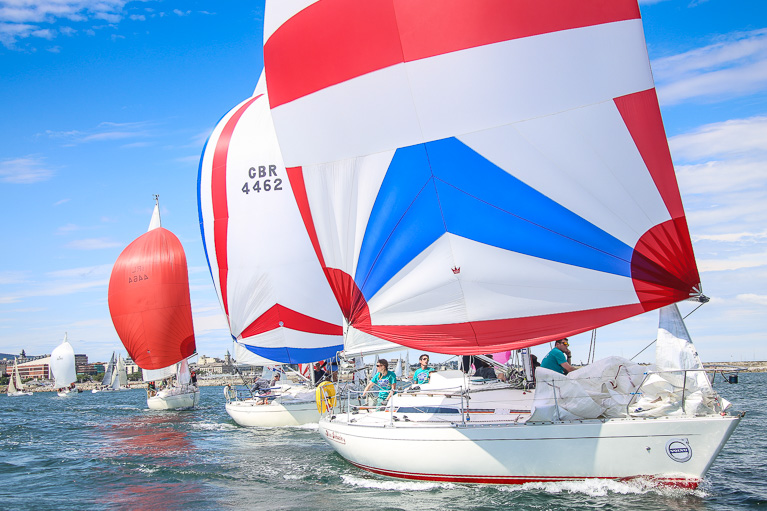 Visiting Sigma 33 crews to Dublin Bay in July visiting crews were made up of young and experienced sailors, both men and women. Photo: Afloat.ie
Visiting Sigma 33 crews to Dublin Bay in July visiting crews were made up of young and experienced sailors, both men and women. Photo: Afloat.ie
The Sigma 33’s were the biggest one design keelboat class at the regatta and this added to the more enjoyable competition for competitors. The visiting crews comprised young and experienced sailors, both men and women. It’s on occasions like that that you think of how good Tim Goodbody was in that he was regularly in the top three in such regattas.
It wasn’t all racing and on the Friday night 120 of the fleet held a bicentennial Dinner in The Royal Irish Yacht Club. Prizes were presented to the winners of the day’s racing “ Mayrise” Alan Harper and Kristy Robertson CCC and “Rupert” Richard and Philip Lovegrove of the RStGYC. Thanks to Dun Laoghaire Harbour Company, each boat was presented with a History of the Harbour.
The local fleet will recognise that they need to be more competitive as a fleet if they are to compete more successfully in this type of competitive regatta. There is a big incentive for the Class. In 2018, the Sigma 33 National Championships and Irish Championships will be held in Dun Laoghaire and 2019 is a Dun Laoghaire Regatta year. It is expected that similar entries to 2017 will compete each year. This also provides a great opportunity for young local sailors to acquire a Sigma 33 with a major event in local waters for each of the next two years and discover how successfully they could compete against the visitors and local sailors.
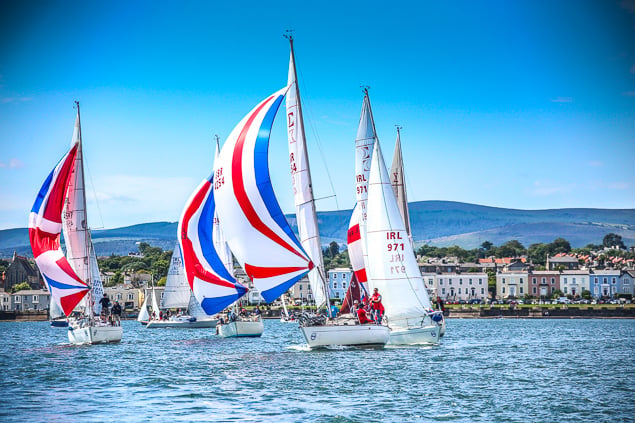 The Sigma 33 Fleet will hold a 'Sigma 33 Morning' on Sunday 24th September 2017 at 9.30am in The Royal St. George in Dun Laoghaire
The Sigma 33 Fleet will hold a 'Sigma 33 Morning' on Sunday 24th September 2017 at 9.30am in The Royal St. George in Dun Laoghaire
As part of the recognition of the changes required to improve our competitiveness, the Sigma 33 Fleet will hold a 'Sigma 33 Morning' to enable anyone interested in buying or sailing on Sigma 33’s to sail on Sunday 24th September 2017 at 9.30am in The George. All are welcome to come down and to join us for finger food afterwards. If you wish to attend please confirm your attendance by contacting Sigma 33 Class Captain Paddy Maguire at [email protected]
#HYC - Howth Yacht Club has posted the Notice of Race and sailing instructions for the Lambay Race and Howth Regatta taking place this Friday 2 and Saturday 3 June.
As previously reported on Afloat.ie, this year’s Lambay Race will feature a special ‘ISORA class’ alongside the day race scheduled by the offshore sailing series this Saturday.
However, the ISORA fleet will continue from the Lambay finish mark in Howth towards Dublin Port to join the festivities at Dublin Riverfest.
As for the annual North Dublin regatta, the entry list stands at 62 boats as of this morning (Monday 29 May).
While the vast majority of entrants are cruisers both spinnaker and non-spinnaker, there are a few Puppeteers, Ruffian 23s and of course Howth 17s in the mix for the races, recently paid tribute by our own WM Nixon.


























